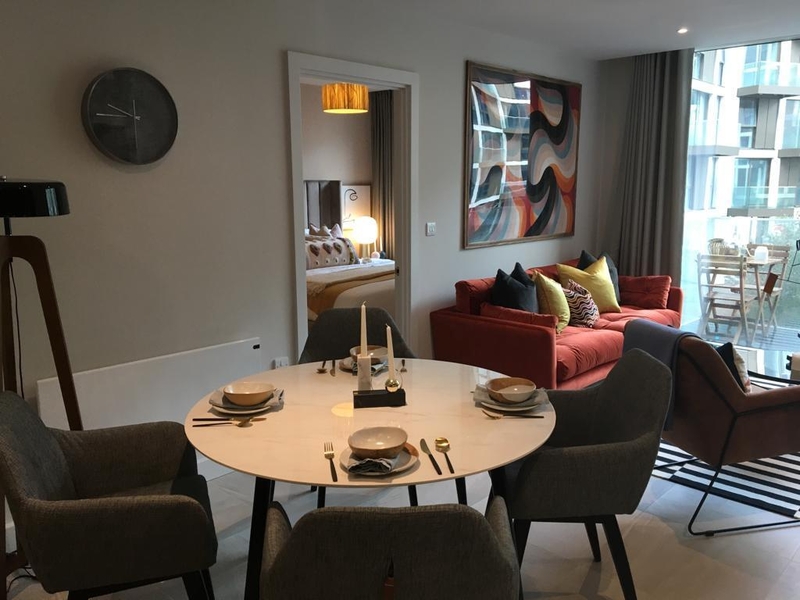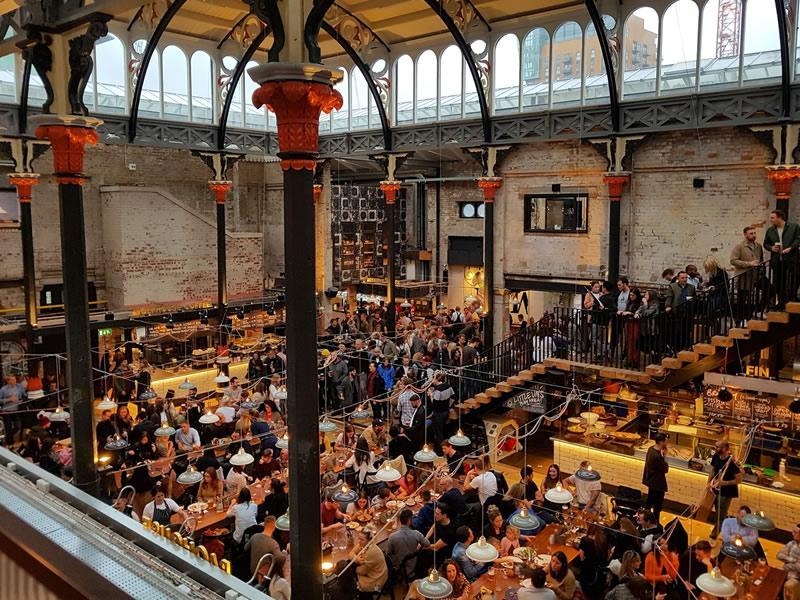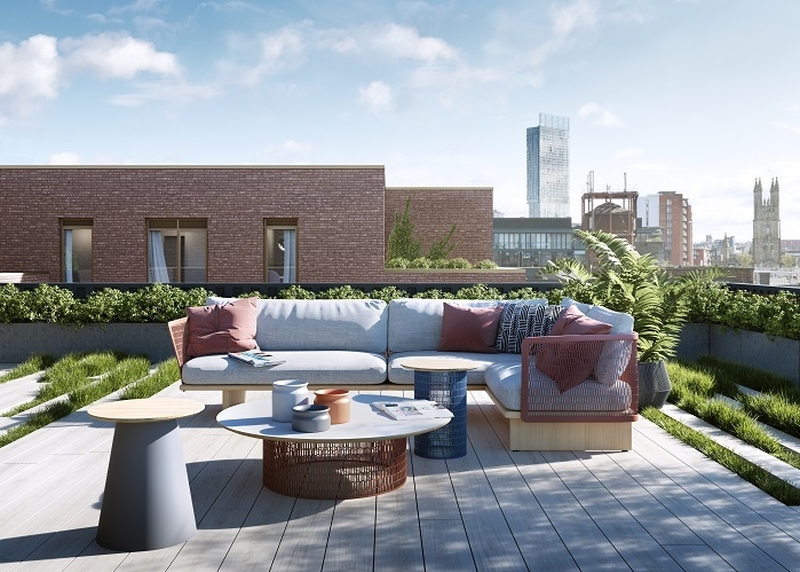Jonathan Schofield chats to long term city centre dwellers ahead of the 'Meet the Neighbours' weekend
It might be friend-of-Confidential Howard Sharrock whom arts group Quarantine want to call. As part of the Meet the Neighbours: The Weekend from 9th - 10th November, they want to find the city centre resident who has lived there the longest.
The question of why people not only move into the city centre but stay is worth exploring, as is the question of whether the city centre is a good place in which to grow old. Indeed, have developers and others realised that the so-called 'empty nester' market has huge potential?
Castlefield was a complete mess full of broken down cars and hookers
“I would never flee to the suburbs," says Howard Sharrock, "because I love living here. I moved into the city centre 40 years ago with the St John’s Gardens development. It was 1979 and the only other people in town aside from the residents of these few townhouses were concierges and publicans. A couple of years later a few other people moved into town living on top of the Manchester Arndale Centre in Cromford Court.
“I don’t even know why I wanted to move in back then, I certainly wasn’t following any of my crowd, but I liked living in the city centre right from the start,” he says. “There were fewer amenities than today, of course, but it seemed to fit me well. Things were closer and easier to access, there was none of that trek in and out of town. That’s always been a part of it, I suppose, an element of laziness. So, even though I might not want to go out for a quick coffee, I know I can.”

He pauses for a moment before continuing, “I also love the cross-section of people you encounter. Suburbs can be ghettos whether rich or poor, there's usually a lot of similar people - especially in the wealthier ones. In the city centre it’s more fluid and, for me, more exciting, and it has progressively got more interesting. When I first started living here, there were some scary parts; the area around Cambridge Street for instance. Castlefield was a complete mess full of broken down cars and hookers."
There must be downsides to living in the city centre?
“Well, nothing that outweighs actually living here,” says Sharrock who presently resides in Century Buildings, Parsonage Gardens. “The homeless problem can be wearing, saddening, there has been nothing like it in my time. But it doesn’t make me want to flee to the suburbs. It makes you want to get involved. And that is key to city centre living.”
I ask Sharrock to explain.
“Simply, that to live in the city centre you have to be get involved - perhaps in two ways. If you see a problem you have to get on to the council or the relevant agency and tell them to sort it out; excess litter, bags of rubbish, traders not doing what they should. The other side of things is you can find your own way to reach into the life of the city. I work a lot with Band on the Wall and the Nordoff Robbins charity.”
Carol Middleton, who lives in the Vicus Building in Castlefield, agrees: “If you are going to make it your home you have to invest in it. This is the city centre after all, it's not as though it's very hard to get involved.”
Carol is a lynchpin of the very active Castlefield Forum, a real success story in terms of a city centre residents' group, and one which Confidential was proud to play a part in creating in the noughties. But what encouraged her to move into the city centre more than 13 years ago?
“We were empty nesters and we were living in Saddleworth,” she says. “We’d talked about living in the city centre so we thought we’d give it a try. Friends and neighbours told us we must be mad and we’d soon be back. They thought we’d miss the local pub, we’d be lonely and the oldest people in the block. Within weeks we’d got two ‘locals’ and had met lots of new friends and interesting people. It was all so smooth. Meanwhile back up there, so many pubs and surgeries for example have closed down.
“I now don’t own a car,” she adds, “I find transport good, I love the culture on my doorstep, the food, I love going to gigs, the walk to the theatre, and how easy it is to get back home.”

Both Middleton and Sharrock note how living in the city centre for older people is healthier in terms of getting your 10,000 steps then living in the hinterlands and the country where the temptation is to drive, or worse, there is no alternative to driving.
My own parents moved from Greater Manchester to a village between Kirby Lonsdale and Kendal which had no shop, pub, or doctor and one bus twice a day. It didn’t even have a church or village hall. As they got older and became ill, the decision seemed increasingly maverick: yet such a move is typical of course and so very British, a sort of societal urban agoraphobia.
Middleton says: “City centres are great places for getting older. The demographic is very mixed, there’s something happening every day, to keep you occupied. I would recommend it to everybody. The family love coming in too, staying over. It’s like going on holiday.”
And where might they be from, I ask Middleton.
“From Stockport,” comes the reply.

Treating the city centre as a holiday destination is one thing, but its general suitability for families is still in doubt.
“My personal experience of the city centre is that it is splendidly developed, the dentist and doctor situation is good, the professionals are on your doorstep, we have lots of amenities," says Sharrock. "Of course, I have no longer any need to bother about schooling, nor do I have small children. The city centre is crap for children though, it really isn't easy for people with young families to live here. That has been very slow to be addressed.”

So the reasons why people are enjoying staying and growing old in the city seem plain: better amenity, less travel hassle, good services, good for health, more action, and more sociability - if you get involved.
Of course, Howard Sharrock and Carol Middleton are just two voices of what are more than 60,000 people living in the central areas at present. I know many many others who would reinforce their points.
With 14,000 new apartments, give or take a few hundred, under development or coming on to the market, industry professionals are starting to wise-up to the potential market. It always seems the glossy promotional brochures and digital marketing on offer rarely depicts anything but gorgeous younger people, seemingly just out of the gym, and about to go for a cocktail. A diverse city centre needs all age ranges.

Nick Legget, senior development manager for Mulbury City, is aware of this. Mulbury City has two schemes under construction in Manchester; Excelsior in Hulme/Castlefield, aimed at owner occupiers, and Blossom Street, a 143 unit PRS scheme in Ancoats.
“We’re aware that if you want a city to continue to grow you have to offer a range of accommodation for all ages. And it has to provide very different things. Young professionals who are renting want to live in buildings that offer the best and latest amenity and lifestyle. So Blossom Street has a large gym, cinema area, roof garden with panoramic views, a private dining room with kitchen and ground floor co-working areas. And we have widened the offer with three bedroom townhouses.
“Excelsior is in Castlefield, a long-standing neighbourhood with many owner occupiers. The emphasis here is not just the canalside location but the size of the apartments and the high specification of fit-out. There will be a double height entrance lobby with co-working space and a resident’s lounge looking out over the canal. There will also be a roof terrace with a number of communal seating areas but no gym, no private dining facilities, no cinema. People who are buying to invest in the long term are rightly more bothered about the fabric of the building, the location and the specification, than extra amenities that will significantly add to maintenance and hence service charge.”

Leggett continues: "Interestingly at Excelsior it is not just first-time buyers who are moving in but more mature buyers. They like the idea of an established neighbourhood but close to everything so they can dib in and out when they want and they want high spec apartments in smaller buildings that they can lock up and leave if they want to go away. Retiring to live down a remote country lane is losing its appeal for many people used to visiting the city for arts and culture.”
Nobody wants a mono-cultural city. For the younger tenant or buyer through to the older tenant and buyer Manchester city centre is shunning such a cul-de-sac. Let's hope one day it may suit families too.
This issue of moving into and living in the city centre and then staying in the city centre is one of themes of Quarantine's Meet the Neighbours: The Weekend.
This should be an interesting couple of days with visits to secret locations, debates, speakers, gigs and meals included in the price of tickets too. Other cities across the world will be brought into the discussion. In short 'project partners, artists, thinkers and researchers will explore the politics of living together and what it might mean to practice neighbourliness'.
Tickets are priced at full weekend £35 (£17.50), Saturday ticket £25 (£12.50), Sunday £12 (£6). The 50% off concessionary rate is available to seniors (aged 60+), under 18s, students in full-time education, job-seekers and those with disabilities. Maybe some of those long-term residents can take advantage.















